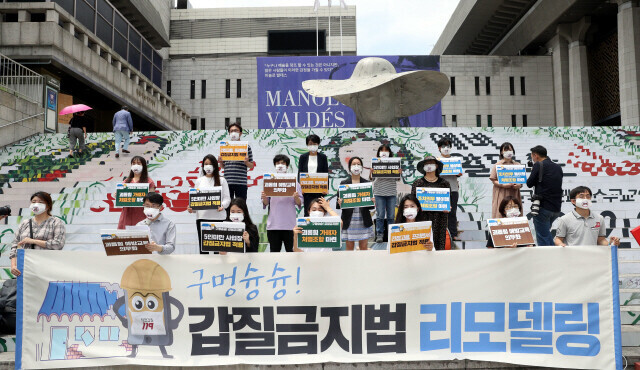hankyoreh
Links to other country sites 다른 나라 사이트 링크
Companies still abuse subcontractor employees despite Supreme Court ruling 10 years ago

Ten years after a Supreme Court ruling determining in-house subcontracting practices to be illegal, subcontractor employees are still dealing with illegal dispatching and abusive practices by employers, case studies show. On July 22, 2010, the Supreme Court ruled that Hyundai Motor was in violation of the law and bore responsibility for employing dispatch workers directly after maintaining the façade of “subcontracts” while actually employing the workers with authority to pay their wages and issue orders.
The discrimination faced by subcontractors was clearly evident in examples of abuse shared on July 19 by the civic group Gabjil 119. One subcontract employee “A” complained of discriminatory practices, explaining, “They keep the air conditioning on at the logistics center where the head office’s managers work, but in the places where it’s mainly subcontractor employees working, they won’t turn on the air conditioning even when it’s over 35 degrees.”
Another person said, “I was verbally abused and reported it to the owners of the subcontractor and principal contractor, but they didn’t take any action.”
“B,” an employee of a tertiary subcontract for one public enterprise, said, “Subcontractor employees don’t get any separate dinnertime when they work the night shift, so we have to make do with a quick cup of instant noodles in between our duties.”
When subcontractor employees form labor unions to oppose their unfair treatment, what they get in return is not compensation but retaliation. Subcontractor employee “C” said, “After forming a union, we requested that the principal contractor’s owner hold negotiations, and they said to tell the president of the subcontractor. Later on, they began overtly working to bust the union, announcing that they planned to end the contract.”
Subcontractors with fewer than 5 employees fall into legal loopholeAlong with workplaces with fewer than five employees, subcontractor workplaces are considered a representative example of a blind spot in labor terms, falling outside the scope of laws forbidding harassment in the workplace. The Act on the Protection, etc., of Dispatched Workers forbids the use of dispatched workers for manufacturing production and process duties, yet illegal dispatching practices continue among principal contractors. Gabjil 119 criticized the principal contractors for sidestepping legal responsibility for the working conditions of indirectly employed workers by insisting that they were “not their employers.”
“The law needs to be amended so that indirectly employed workers are also protected from abuses within the workplace,” Gabjil 119 said.
“Principal contractor owners and managers also need to be included as subject to the law banning workplace harassment, and the terms need to be expended to special employment workers and workers at workplaces with four or fewer employees,” it stressed.
Subcontractor employees are also facing many times the burden of suffering that regular employees do in relation to the COVID-19 pandemic. The results of a survey administered to 1,000 company employees by Gabjil 119 last month showed 26.3% of irregular workers saying that they had unwillingly experienced unemployment over the six months since the outbreak began -- nearly 6.5 times higher than the 4.0% of regular employees who reported the same. As the virus has caused financial difficulties for companies, the businesses have taken the relatively easier step of letting go of subcontractor employees by cancelling their contractors.
Among the demands shared by Gabjil 119 were an amendment of the Workplace Harassment Prevention Law, the establishment of coronavirus response measures for subcontractor employees, implementation of the 2010 ruling deeming Hyundai Motor responsible for illegal dispatching practices as a primary contractor, and an amendment of labor laws to make primary contractors responsible for negotiations as employers.
By Oh Yeon-seo, staff reporter
Please direct comments or questions to [english@hani.co.kr]

Editorial・opinion
![[Editorial] Does Yoon think the Korean public is wrong? [Editorial] Does Yoon think the Korean public is wrong?](https://flexible.img.hani.co.kr/flexible/normal/500/300/imgdb/original/2024/0417/8517133419684774.jpg) [Editorial] Does Yoon think the Korean public is wrong?
[Editorial] Does Yoon think the Korean public is wrong?![[Editorial] As it bolsters its alliance with US, Japan must be accountable for past [Editorial] As it bolsters its alliance with US, Japan must be accountable for past](https://flexible.img.hani.co.kr/flexible/normal/500/300/imgdb/original/2024/0417/6817133413968321.jpg) [Editorial] As it bolsters its alliance with US, Japan must be accountable for past
[Editorial] As it bolsters its alliance with US, Japan must be accountable for past- [Guest essay] Amending the Constitution is Yoon’s key to leaving office in public’s good graces
- [Editorial] 10 years on, lessons of Sewol tragedy must never be forgotten
- [Column] A death blow to Korea’s prosecutor politics
- [Correspondent’s column] The US and the end of Japanese pacifism
- [Guest essay] How Korea turned its trainee doctors into monsters
- [Guest essay] As someone who helped forge Seoul-Moscow ties, their status today troubles me
- [Editorial] Koreans sent a loud and clear message to Yoon
- [Column] In Korea’s midterm elections, it’s time for accountability
Most viewed articles
- 1[Column] The clock is ticking for Korea’s first lady
- 2Samsung barricades office as unionized workers strike for better conditions
- 3[Editorial] When the choice is kids or career, Korea will never overcome birth rate woes
- 4[News analysis] After elections, prosecutorial reform will likely make legislative agenda
- 5S. Korea, Japan reaffirm commitment to strengthening trilateral ties with US
- 6Why Israel isn’t hitting Iran with immediate retaliation
- 7[Guest essay] How Korea turned its trainee doctors into monsters
- 8Japan officially says compensation of Korean forced laborers isn’t its responsibility
- 9[Editorial] Does Yoon think the Korean public is wrong?
- 10[Editorial] 10 years on, lessons of Sewol tragedy must never be forgotten